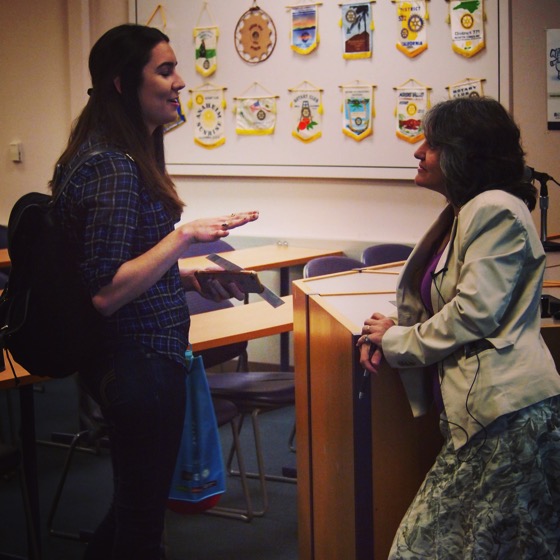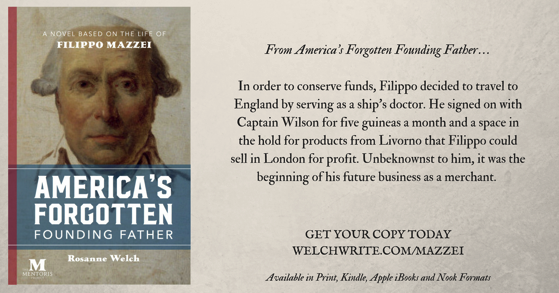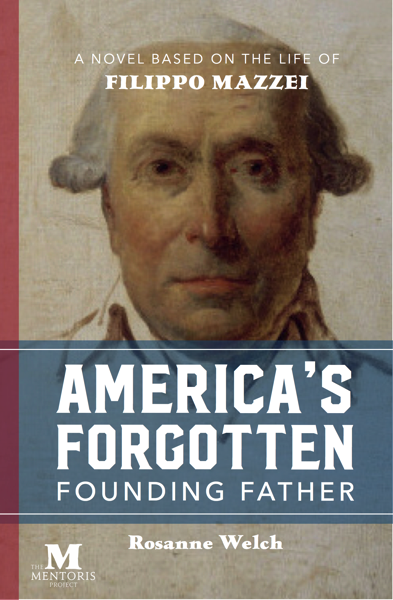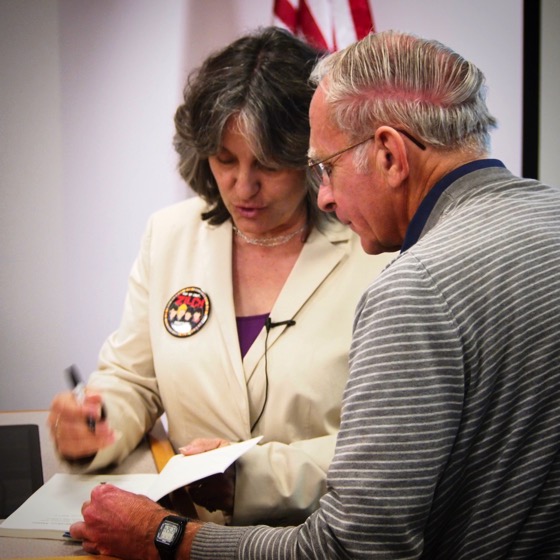Why The Monkees Matter: Teenagers, Television and American Pop Culture
02 The Writers of The Monkees from How The Monkees Changed Television with Rosanne Welch, PhD [Video] (1:06)
Rosanne Welch, PhD, Author of Why The Monkees Matter, presents “How The Monkees Changed Television” at a Cal State Fullerton Lunch Lecture on May 8, 2018.
In this talk, she shows how The Monkees, and specifically their presence on television, set the stage for large changes to come in the late 1960s.
Transcript
As a kid, all I wanted was to meet Micky Dolenz — who’s the guy on the far right in case you don’t know that because you’re too young to know who I’m talking about right now, but that was really funnny to me and the kids reacted well to the show and that taught me that it did have something to say to a newer generation so I thoguht, “Hmm”and then ended up writing an article — I’m on the editorial board of Written BY magazine which is the magazine of the Writers Guild of America and I wrote an article about the show, because we write about writers so I thought to myself, “Hmmm, how many of the writers are still alive?” and there were about 7 of the orignal 15 and they were welcome to chat about their time on the show. So, I met with them at their various homes in Beverly Hills, because they made a lot of money in television way back in the day and found that many of them grew up — “grew up” — they were young when they wrote on this show. They were all newcomers and many of them went on to win Emmy Awards including Treva Silverman who was the first female to be on a comedy show without a male partner. So she was solo writing on the show and we’re talking about 1966 so that was a big deal not to have a “boy” help you.
Why The Monkees Matter: Teenagers, Television and American Pop Culture
McFarland (Direct from Publisher) | Amazon | Kindle Edition | Nook Edition
About Rosanne Welch, PhD
Rosanne Welch, PhD is a writer, producer and university professor with credits that include Beverly Hills 90210, Picket Fences, Touched by an Angel and ABC NEWS/Nightline. Other books include Why The Monkees Matter: Teenagers, Television and American Pop Culture (McFarland, 2017) and Women in American History: A Social, Political, and Cultural Encyclopedia and Document Collection (ABC-CLIO, 2017), named to the 2018 Outstanding References Sources List, by the Reference and User Services Association (RUSA), a division of the American Library Association. Welch has also published chapters in Torchwood Declassified: Investigating Mainstream Cult Television (I.B.Tauris) and The American Civil War on Film and TV: Blue and Gray in Black and White and Color (Lexington Books, 2018) and essays in Doctor Who and Race: An Anthology and Outside In Makes it So, and Outside in Boldly Goes (both edited by Robert Smith). By day she teaches courses on the history of screenwriting and on television writing for the Stephens College MFA in Screenwriting programs. Her talk “The Importance of Having a Female Voice in the Room” at the 2016 TEDxCPP is available on YouTube.
Podcast: Play in new window | Download
Subscribe: RSS
Chatting with fellow Monkees fans via My Instagram
Chatting with fellow Monkees fans
At my presentation on “How The Monkees Changed Television” at Cal Fullerton Lunchtime Lectures
Watch the complete presentation
See all the photos from this presentation
Why The Monkees Matter: Teenagers, Television and American Pop Culture
McFarland (Direct from Publisher) | Amazon | Kindle Edition | Nook Edition
Want to use “Why The Monkees Matter” in your classroom?
Order Examination Copies and Campus Bookstore orders directly from McFarland
When Women Wrote Hollywood – 1 in a series – “The Red Kimono” – Story by Adela Rogers St. Johns, Directed and Starring Dorothy Davenport
To highlight the wonderful yet largely forgotten work of a collection of female screenwriters from the early years of Hollywood (and as a companion to the book, When Women Wrote Hollywood) we will be posting quick bits about the many films they wrote along with links to further information and clips from their works which are still accessible online. Take a few moments once or twice a week to become familiar with their names and their stories. I think you’ll be surprised at how much bold material these writers tackled at the birth of this new medium. — Rosanne Welch
“The Red Kimono” – Story by Adela Rogers St. Johns, Directed and Starring Dorothy Davenport
A clip from The Red Kimono
Original Poster Art

The Red Kimono is a 1925 American silent film drama about prostitution produced by Dorothy Davenport (billed as Mrs. Wallace Reid) and starring Priscilla Bonner.
The film is notable today for being one of the few independent productions produced and written by women. This is the third of Davenport’s “social conscience” releases, preceded by Human Wreckage (1923) on the topic of drug addiction (released five months after Wallace Reid‘s death from morphine), and Broken Laws (1924) about excessive mother-love.
The film is based on a real case of prostitution that took place in New Orleans in 1917. This film, billing itself as a true story, used the real name of the woman played by Priscilla Bonner who as a consequence sued producer Dorothy Davenport for a hefty sum in court and won.[1] The case, Melvin v Reid has been cited recently in the emerging “right to be forgotten” cases around the world as an early example of one’s right to leave a past one wishes to forget. In the ruling of the California Appellate Court (Melvin v. Reid, 112 Cal.App. 285, 297 P. 91 (1931)) the Court stated, “any person living a life of rectitude has that right to happiness which includes a freedom from unnecessary attacks on his character, social standing or reputation.”[citation needed]
As with Davenport’s earlier Human Wreckage in 1924, this film was banned in the United Kingdom by the British Board of Film Censors in 1926.[2] In the 1920s, the film was also banned in the city of Chicago[3][4]. — Wikipedia
More information on Red Kimono
- Read more about this screenwriter in When Women Wrote Hollywood
- Watch Red Kimono on Canopy (free via many public library web sites)
- Red Kimono on IMDB
- Red Kimono on Wikipedia
- Books by Adela Rogers St. Johns
* A portion of each sale from Amazon.com directly supports our blogs
** Many of these books may be available from your local library. Check it out!
† Available from the LA Public Library
Quote from “America’s Forgotten Founding Father” by Dr. Rosanne Welch – 13 in a series – Merchant Beginnings
In order to conserve funds, Filippo decided to travel to England by serving as a ship’s doctor. He signed on with Captain Wilson for five guineas a month and a space in the hold for products from Livorno that Filippo could sell in London for profit. Unbeknownst to him, it was the beginning of his future business as a merchant.
From America’s Forgotten Founding Father — Get Your Copy Today!
Print Edition | Kindle Edition | Apple iBooks Edition | Nook Edition
Chatting with fellow Monkees fans via Instagram
Chatting with fellow Monkees fans
At my presentation on “How The Monkees Changed Television” at Cal Fullerton Lunchtime Lectures
Watch the complete presentation
See all the photos from this presentation
Why The Monkees Matter: Teenagers, Television and American Pop Culture
McFarland (Direct from Publisher) | Amazon | Kindle Edition | Nook Edition
Want to use “Why The Monkees Matter” in your classroom?
Order Examination Copies and Campus Bookstore orders directly from McFarland
13 Steven Moffat, Representation and Doctor Who from Gender Diversity in the Who-niverse [Video] (1:01)
Watch this entire presentation: Gender Diversity in the Who-niverse: Paving the Way for a Lady Doctor with Dr. Rosanne Welch [Video] (36:58)
For her 5th Doctor Who lecture to the CPP community, Dr. Rosanne Welch discusses how society – and the show’s writing staff – prepared the audience for a major change in this 50-year franchise – the creation of the first Lady Doctor!
Transcript:
So Russell Davies brought this new thing into the program — this new ability to represent. Now we have Steven Moffat who took over after Russell Davies and sometimes there’s controversy over Steven — was he as good, people don’t like him or they do like him. I think he did a lot of good things for the show particularly in paying with what kinds of women who traveled with The Doctor and how they were represented. Right? He gave us Amy Pond who’s married to a male nurse. We have a man in a generally, stereotypically female job and they are this perfect, lovely little couple. So I think that’s cool. He gave us Kate Lethbridge-Stewart, the daughter of a character that I’ll talk about in a little bit and she’s a Brigadier in the Army. He gave us Mels who is a Time Lord herself. We’ll talk about here in a minute. he gave us the first lesbian couple and it’s a lesbian alien-human couple. Right? You can’t get much more representative than that. Right? Madame Vastra and Jennie.
Follow Dr. Welch on Twitter and Instagram
https://twitter.com/rosannewelch – http://instagram.com/drrosannewelch
Rosanne Welch, PhD
Rosanne Welch PhD teaches the History of Screenwriting and One-Hour Drama for the Stephens College MFA in Screenwriting.
Writing/producing credits include Beverly Hills 90210, Picket Fences, ABCNEWS: Nightline and Touched by an Angel. In 2016 she published the book Why The Monkees Matter: Teenagers, Television and American Pop; co-edited Women in American History: A Social, Political, and Cultural Encyclopedia; and placed “Transmitting Culture Transnationally Via the Characterization of Parents in Police Procedurals” in the New Review of Film and Television Studies. Essays appear in Torchwood Declassified: Investigating Mainstream Cult Television and Doctor Who and Race: An Anthology. Welch serves as Book Reviews editor for Journal of Screenwriting and on the Editorial Advisory Board for Written By magazine, the magazine of the Writers Guild.
Watch Dr. Welch’s talk “The Importance of Having a Female Voice in the Room” at the 2016 TEDxCPP.
Podcast: Play in new window | Download
Subscribe: RSS
Memorial Day, Michener and South Pacific
I was missing the Memorial Day parades of my Cleveland, Ohio childhood until I realized I was engaging in an individual Memorial Day event without even planning such coordination.
Having taken my Mom to see a touring company of South Pacific for Mothers Day a few weekends back at the La Mirada Theatre, I had finally decided I ought to read the book from which the musical sprang so I ordered a copy of James Michener’s Tales of the South Pacific. I’ve been spending the day learning more about the men and women (remember there were nurses nearly wherever the soldiers were sent) who patrolled the Pacific in the early days of WWII. It’s a kind of double-major moment since it’s also allowing me the chance to consider which of the many tangential stories Oscar Hammerstein chose to include in the adaptation.
Review of the La Mirada Touring version of South Pacific
It’s also allowed me to recognize a part of my reader personality that I don’t think I had ever noticed – books hit me like the lightning bolt of Italian romantic myths. Tales of the South Pacific has always been available to me but it wasn’t until I had a reason to read it that suddenly I found a way to slide some reading time into my busy grading and writing schedule. And then I swallow that book I’ve been meaning to read in a couple of days – like taking a vacation from life and work for a few hours without the cost of fuel or lodging. Books – the world’s cheapest vacations!
†
* A portion of each sale from Amazon.com directly supports our blogs
** Many of these books may be available from your local library. Check it out!
† Available from the LA Public Library
Signing books for readers at my presentation on “How The Monkees Changed Television” at Cal Fullerton Lunchtime Lectures
Watch the complete presentation
See all the photos from this presentation
Why The Monkees Matter: Teenagers, Television and American Pop Culture
McFarland (Direct from Publisher) | Amazon | Kindle Edition | Nook Edition
Want to use “Why The Monkees Matter” in your classroom?
Order Examination Copies and Campus Bookstore orders directly from McFarland
Penguin Encounter! via My Instagram
Getting to meet Cito, the Humboldt Penguin during Channel Island Fox Working Group Conference at the Santa Barbara Zoo.
Learn more about penguins with these books
* A portion of each sale from Amazon.com directly supports our blogs
** Many of these books may be available from your local library. Check it out!
† Available from the LA Public Library

![02 The Writers of The Monkees from How The Monkees Changed Television with Rosanne Welch, PhD [Video] (1:06)](https://rosannewelch.com/wp-content/uploads/2018/05/monkees-tv-02-writers.jpeg)





![13 Steven Moffat, Representation and Doctor Who from Gender Diversity in the Who-niverse [Video] (1:01)](https://rosannewelch.com/wp-content/uploads/2018/05/gender-dw-13-moffat-1.jpeg)



 and Follow
and Follow

